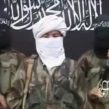
Journal of the Turkistan Islamic Party Urges Jihad in China
Publication: Terrorism Monitor Volume: 7 Issue: 9
By:

The latest issue of a journal entitled Turkistan al-Muslimah (Muslim Turkistan) was recently published by a jihadi web forum (muslm.net, March 26). The journal is identified as the work of al-Hizb al-Islami al-Turkistani (Turkistan Islamic Party – TIP). The first issue of the journal was originally published on July 2008 by al-Fajr Institute for Islamic Media, which usually publishes materials on the activities of al-Qaeda affiliated groups in regions such as Afghanistan, North Africa and “East Turkistan” (China’s Xinjiang province). The first issue was republished on jihadi websites in January, with the second issue following in February (almedad.com, January 26; al-faloja.info, February 20).
The three issues are similar to other jihadist journals such as Sawt al-Jihad (Voice of Jihad), published by al-Qaeda in Saudi Arabia between 2004 and 2007, Sada al-Malahim (The Echo of Battles), produced by al-Qaeda in Yemen, or Qaddaya Jihadiyh (Jihadi Issues), published by al-Yaqeen Media Center. Turkistan al-Muslimah follows the practice of dividing the articles between political and religious topics, serving as both “alternative” media and a recruitment tool for jihadis.
Turkistan al-Muslimah focuses on Chinese government discrimination against the Turkic Uyghur Muslims of China, while excluding mention of China’s Hui (Han Chinese) Muslims. The journal has the stated aim of revealing “the real situation of our Muslim nation in East Turkistan, which is living under the occupation of the Communist Chinese and to disclose the falsehood of the Chinese government, exposing its crimes [against Muslims] to the world… [we want the] world to understand our cause and rights, that we are seeking our freedom and independence and to be ruled by God’s Shari’a” (Issue 1).
Like other jihadi journals, Turkistan al-Muslimah publishes an obituary in each issue for a mujahid killed by the Chinese. The first issue devoted several pages to a profile of the late Hasan Mahsum (a.k.a. Abu Muhammad al-Turkistani – referred to in the journal as “Hasan Makhdoom”), leader of the radical East Turkistan Islamic Movement (ETIM) until his death at the hands of Pakistani security services in 2003.
The journal also published a multi-part interview with the leader of the TIP, Amir Abdul Haq. In the first part of the interview, Abdul Haq gave details of his early life and religious education and described his passage to Pakistan and then to Afghanistan. In the second part of the interview, the Amir spoke about the training camps he and his Uyghur colleagues attended in Khost, Bagram, Kabul and Herat in the late 1990s, when Afghanistan was still controlled by Taliban. He informed the readers that the Uyghur group was part of the military wing of the Islamic Movement of Uzbekistan (IMU) led by the late Uzbek jihadi commander, Juma Namangani (Issue 3 pp 10-11). The TIP was unknown before it emerged last year to make unsubstantiated (and often implausible) claims of responsibility for various terrorist actions across China. It also issued threats of biological, chemical and conventional attacks on the 2008 Beijing Olympics, though the group apparently failed to carry out any operations during that period. Little has been heard from the movement since.
In the three issues published so far, the journal shows a proclivity for using the rhetoric favored by al-Qaeda and its affiliate Salafi-Jihadi groups. This can be noticed in the quotes from Salafi theological materials, in the publication of news of jihadi operations in Afghanistan and elsewhere, and in the political rhetoric the journal has adopted. In a section entitled: “Sayings of the Leader Hasan Makhdoom (i.e. Hasan Mahsum),” the second issue of the journal quotes the ETIM leader as saying “preparation for jihad” is an Islamic duty. [1]
The journal has also adopted al-Qaeda’s understanding of the global economic crisis. In an article about the crisis, “Abu Khaled Saifallah” wrote, “The causes of this crisis are: 1) the September 11 [attack] and the destruction of the World Trade buildings, which served as the treasury for the world, thus it speeded up the collapse of the capitalist system of free banking and the destruction of all banks and foreign investment; and 2) The riba [usury]-based system, which is called interest, and is prohibited in Islam” (Issue 2, p.32).
In an article written by an individual identified as Abu Ja’afar al-Mansour, the Qaeda style message appears to be more clear, with the writer issuing a warning to Beijing; “China beware… take a lesson from those who preceded you, the Americans and [their] allies, who were defeated badly in Iraq, Afghanistan and Somalia. Do not walk on the same road and do not use the [same] approach in prejudices [against] God’s subjects and in looting their wealth and fortunes, and in shedding the blood of the children…as America is doing in Iraq and Afghanistan” (Issue 3).
The language of the journal is loaded with concepts and phrases used by al-Qaeda and affiliated groups. Abu Umar al-Farouq wrote an article in the third issue of the journal describing Hasan Mahsum as a jihad leader comparable to Abu Mus’ab al-Zarqawi and Omar al-Baghdadi in Iraq or Abdul Malik Droukdel (a.k.a. Abu Mus’ab Abdul Wadood) in Algeria. The existing issues of the journal show that either the “Turkistan Islamic Party” is trying to associate itself with al-Qaeda and allied Salafi-Jihadi groups or al-Qaeda is aiming to attract “Turkistanis” to their global jihadi movement.
Notes
1. One of the first to identify jihad as fard ayn (an individual obligation, or duty) was the Egyptian ideologue of Tanzim al-Jihad, Muhammad Abd al-Salam Faraj. Faraj’s book, Al-farida al-gha’iba (The Absent Duty), became an important part of global jihadi literature. Faraj was executed in 1982 for his role in the assassination of Egyptian president Anwar al-Sadat.





